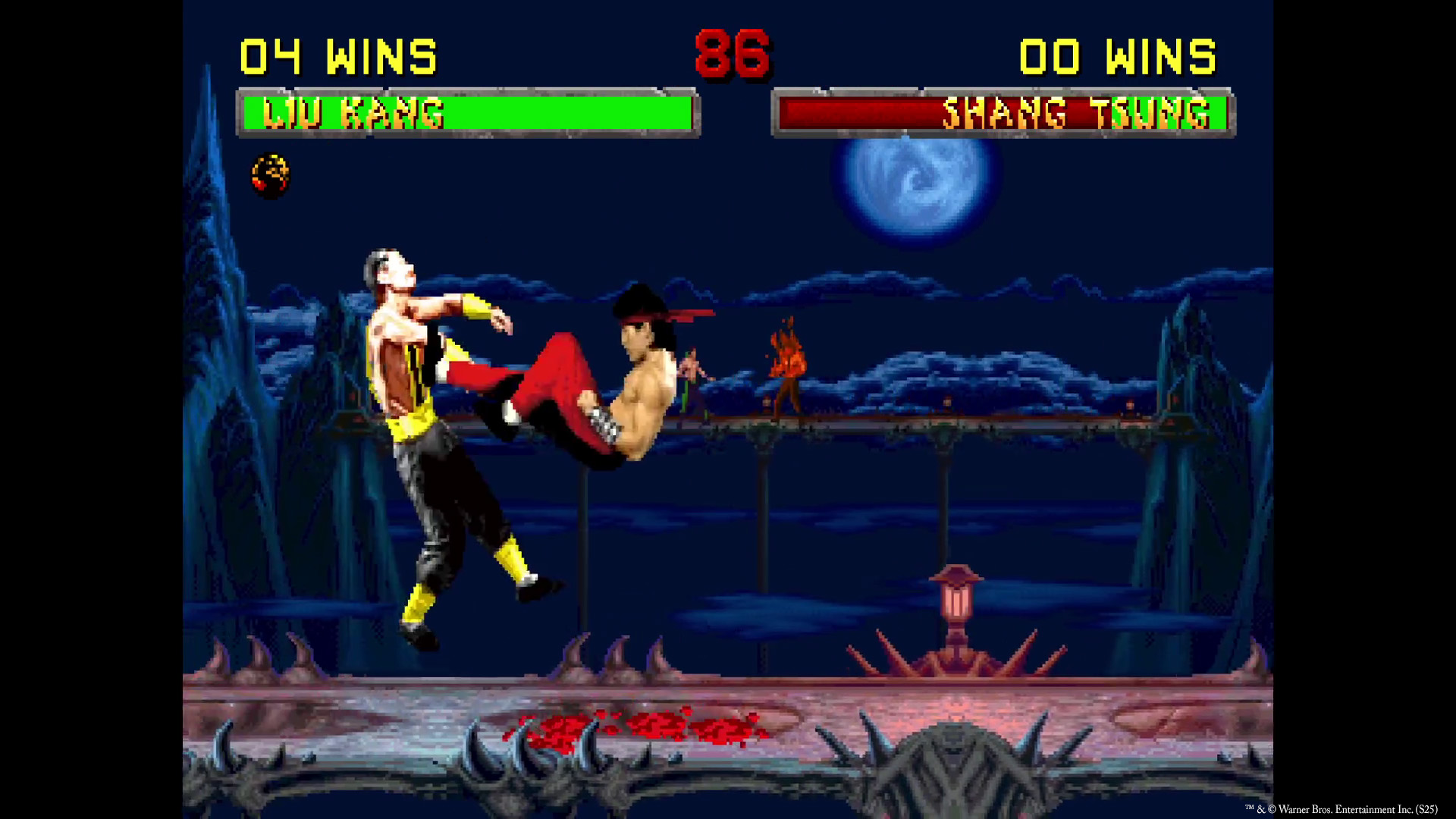**Mortal Kombat: Legacy Kollection – A Journey Through the Franchise’s Humble Beginnings**
Mortal Kombat has been around for so long, it’s easy to take it for granted. NetherRealm’s newer fighting games have consistently set the standard for what fighting games can be—both in terms of competitive contests and single-player storytelling. Older generations may have forgotten the series’ humble beginnings, while younger players might not even be aware of them at all.
Enter *Mortal Kombat: Legacy Kollection*, a compilation from Atari and Digital Eclipse that tells the story of the franchise’s earliest days. It does so in a way that’s informative, honest, and—most importantly—fun. While the games may not be as polished as their modern counterparts, they remain a blast to revisit, sometimes enhanced by subtle quality-of-life improvements.
—
### Primitive Kombat – Classic Games Through the Ages
*Mortal Kombat: Legacy Kollection* features a mixture of classic games spanning arcade, home consoles, and handheld devices. Digital Eclipse, known for their expertise in preserving and presenting retro games to new audiences, faced unique challenges with this collection. Some games are presented “warts and all,” providing a fascinating historical perspective, especially for early Mortal Kombat titles which existed in multiple versions across different platforms.
For example, the original *Mortal Kombat* on Super Nintendo included voices, while the Sega Genesis version featured blood—though hidden behind a secret code. Similarly, *Mortal Kombat II* had noticeably different visuals on arcade, Super Nintendo, Sega Genesis, and Sega 32X versions, with gameplay differences that extended beyond appearance.
One standout difference from these older fighting games was the loading speed. The Super Nintendo version of *Mortal Kombat II*, in particular, exhibited noticeable stuttering at the start of each round. In general, these versions felt distinctly slower compared to their arcade counterparts. Yet, in many ways, this slower pace is part of their charm—reflecting the standards and technology of the 1990s. At the time, these games’ hard-hitting violence and over-the-top finishers were revolutionary.
—
### Quality-of-Life Improvements & Gameplay Optimizations
While many games in this collection retain their original feel, Digital Eclipse stepped in to improve certain titles. Notably, the PlayStation versions of *Mortal Kombat Trilogy* and *Mortal Kombat Mythologies: Sub-Zero* benefit from optimized loading times and smoother gameplay. Features like a Rewind function in *Mythologies: Sub-Zero* help address some inherent flaws without compromising the original game experience.
Having a more playable version of *Mortal Kombat Trilogy* on PlayStation is a welcome addition, though it left me feeling conflicted about the inconsistency in performance improvements across the collection. While I would have liked to see similar optimizations applied to the older titles, there is a certain charm in preserving them just as they were.
—
### Helpful Features and Hidden Extras
The collection’s biggest benefit lies in its quality-of-life options. On-screen move lists, Fatality timers, and a variety of cheats enrich the player experience. Some features delve into historical curiosities, such as unlocking developer options in the arcade versions.
No conversation about Mortal Kombat’s history is complete without mentioning the iconic secret characters. Players can now access the Reptile fight from the original *Mortal Kombat* and the Smoke, Jade, and Noob Saibot fights from *Mortal Kombat II* without completing the original, often complex, conditions—making these surprises far more accessible for longtime fans.
There are even unlockables I hadn’t heard of before, like the ability to play as Goro in the Game Boy version of *Mortal Kombat*. Such surprises enhance the collection’s appeal.
—
### What’s Missing? A Few More Classics
While the arcade version of *Mortal Kombat 4* is a strong inclusion that highlights the end of the series’ original 2D era, I would have loved to see the Sega Dreamcast port explored as well.
Similarly, *Ultimate Mortal Kombat 3* is represented here by the arcade and Super Nintendo versions, but including the Sega Saturn version for comparison would have been interesting.
Though Digital Eclipse’s work on the PlayStation version of *Mortal Kombat Trilogy* is amazing, seeing the Nintendo 64 version alongside it would have offered an insightful look at CD versus cartridge iterations.
Despite these omissions, this collection offers a strong lineup of classic fighting games, flawed platformers, and handheld curiosities—each worthy of a playthrough to appreciate their historical significance. Yes, even *Mortal Kombat: Special Forces*.
—
### The Documentary: A Heartfelt Look Back
A large portion of the *Mortal Kombat: Legacy Kollection* is dedicated to five-to-ten-minute documentary vignettes telling the story of the series’ original development team. It’s one thing to recognize *Mortal Kombat* as an all-time top franchise—it’s another to see the early origins of Ed Boon, John Tobias, John Vogel, and Dan Forden as they began at Williams Bally/Midway.
An early introduction segment features the four creators introducing themselves in a Beatles-esque style—a type of story that has become increasingly rare in today’s gaming landscape.
Digital Eclipse delivers a genuine 1990s time capsule complete with original pitches, press releases, TV commercials, magazine clippings, and behind-the-scenes footage from various events. The documentary not only tells the story of *Mortal Kombat* but also reveals the scale of its impact as a pop culture phenomenon.
While modern games sell more units and generate more revenue—something Boon acknowledges near the documentary’s end—this timeline clearly expresses how *Mortal Kombat* conquered the world in its early years.
—
### Honesty and Insight: Reflecting on Challenges
Unlike many “rah-rah” retrospective stories, this documentary maintains a refreshingly honest tone throughout. It celebrates early successes but also confronts the franchise’s pivotal moments with sincerity.
The transition to 3D marked a significant turning point highlighted toward the end of the documentary. Though *Mortal Kombat 4* is seen in hindsight as a fun novelty in 2025, the team candidly discusses the risks of moving into 3D, the fading arcade culture, and how this period served as a critical stepping stone for the audience.
The documentary acknowledges the turmoil of that era without shying away from both the merits and faults of the late ’90s post-*MK3* games.
The timeline slows down toward the finish line, providing only brief summaries of the 2000s and 2010s *Mortal Kombat* titles without much behind-the-scenes content. While the collection isn’t focused on these later games, their inclusion raises questions about the choice to end there rather than at the natural conclusion of the 3D era.
That said, the final vignette—a reunion that revisits nearly everyone featured—adds a heartwarming close to the story.
—
### Round 1: Verdict
As fighting games, none of the titles in *Mortal Kombat: Legacy Kollection* can match the polish and speed of NetherRealm’s current offerings. The earliest *Mortal Kombat* games may feel jarring at times due to their slower pace and primitive presentation.
Fundamentally, though, these games hold up, particularly when played locally with friends. They showcase the building blocks that would evolve into today’s legendary Mortal Kombat series.
The quality-of-life features and gameplay optimizations, especially for *Mortal Kombat Trilogy*, significantly enhance the experience, smoothing out rough edges from the original hardware limitations. Added training tools also help players practice and improve across several titles.
Paired with classic games and a heartfelt documentary, *Mortal Kombat: Legacy Kollection* demonstrates once again that Digital Eclipse is unmatched when it comes to crafting top-tier compilations.
Whether you’re an old-school Mortal Kombat fan or a parent wanting to show your kids what the series looked like in its infancy, this collection is hands down the best way to do it.
—
**Ready to relive the brutal glory days of *Mortal Kombat*? *Legacy Kollection* is waiting in the arena.**
https://www.shacknews.com/article/146581/mortal-kombat-legacy-kollection-review-score



